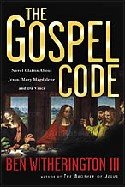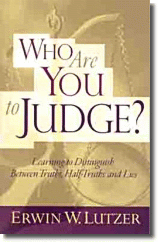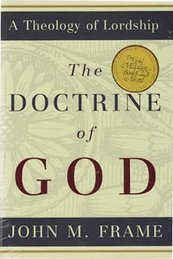About two years ago, a Christian in her early 20s (who had stopped going to Church) asked me what I thought of the novel. I said that I hadn't read it, so I couldn't comment. Since she was halfway through reading the book, i asked her to share what she had read. After her sharing(which I can't remember now!), I was a little worried. "Would this book result in her never to return to her church?" So, still unable to comment, I asked her whether she thinks what Brown wrote make sense. I think the only answer I gave was this: If the bible is errant, and Jesus is not what he claim to be, would the church have survived for 2000 years?
For 2000 years (or should I say since the creation of the world), God has been actively engaged with the world. If we were to look at even the Pentateuch, we would find that God is intimately engaged with human history. The frequently mentioned divine appearances of God in the biblical text shows this. Genesis 6:6-7 (NIV) has this: "The LORD was grieved that he had made man on the earth, and his heart was filled with pain. So the LORD said, "I will wipe mankind, whom I have created, from the face of the earth—men and animals, and creatures that move along the ground, and birds of the air—for I am grieved that I have made them." " God is intimately engaged with us as He loves us. Genesis 6:6-7 precisely describes the response of God to human sin. Grief is love's response to sin. God is no stoic; He is a person Who rejoices in men's salvation and obedience, and Who grieves at unbelief and disobedience. The purpose of God for mankind never changed. God has not been remote from His creation. If He is, his emotions would not have changed. He would rather look on as unmoved and unmovable diety, dispationately contemplating the mess it had become and would still beccome. Under the providence of God, the church had survived for 2000 years.
The controversial Episcopal Bishop of Newark (
In Genesis 8:21 (NIV), we see that: The LORD smelled the pleasing aroma and said in his heart: "Never again will I curse the ground because of man, even though every inclination of his heart is evil from childhood. And never again will I destroy all living creatures, as I have done.
A remote God would not sniff the "pleasing aroma" and of the sacrifice and announce a change in divine intentions. Similarly, in Genesis 11:7, the Lord said: "Come, let us go down and confuse their language so they will not understand each other." A remote God would not deign to "Come, let us go down" to meddle in human afairs and steer the creature away from doing more harm. As one author puts it, a remote God "would hardly pin so many hopes on and invest so much energy in an unruly and rebellious crowd such as the 'the children of
Maximus the Confessor (c. 580-662) believed that the way to know God was through worship and prayer rather than through trying to frame beliefs as clearly as possible in words. Do present-day Christians also think this way? From my observation, certain brands of the Charismatic movement supports this view! Yes, in worship and prayer, we can sense the presence of God, but to know God, as the Belgic Confession puts it, there are two means:
First, by the creation, preservation, and government of the universe, since that universe is before our eyes like a beautiful book in which all creatures, great and small, are as letters to make us ponder the invisible things of God: his eternal power and his divinity, as the apostle Paul says in Romans 1:20. All these things are enough to convict men and to leave them without excuse.
Second, he makes himself known to us more openly by his holy and divine Word, as much as we need in this life, for his glory and for the salvation of his own.
It is only when understand the bible well, that we will be able to know God. [Yes, experiences and reason are also vital (but this is a topic of discussion for another day!). ] It is only when we know the bible well that we would be able to defend our faith. John Shelby Spong said that Christianity must Change or Die. For me, I think it is more of Christians must worship God, understand the bible, pray,... or die. (of course everything is as God decree it to be) For us Christians, I think Aquinas has something which we need to and can learn from. Aquinas, in the middle of the 13th century composed a Summa 'against the unbelievers' ( Summa contra Gentiles) . His methods was to take heresies topic by topic, listing all the ways he knew of believing wrongly about each point of a systematic theology, the existence of God, the nature of God, the Trinity, Incarnation, and so on. Aquinas intended his Summa contra Gentiles to provide the Dominicans with a handy reference manual of answers when they encountered heresy. Of course, we are not Aquinas, we may not such extensive knowledge, but we can always learn. In this era where a new book is almost published everyday, and online resources is easily available, finding the required resources and llearning should never be a problem. If we are able to be prepared to give a response to unbelievers on the DVC, the DVC movie would provide us with great evangelistic opportunities.
For Aquinas, he believes there is nothing very new in heresy, the same old ideas merely reappear in new guises. In a way, the DVC is the same. The DVC raised many questions, but I think some of are:
What are some claims Dan Brown makes in his book The Da Vinci Code?
Who was Mary Magdalene?
Was Jesus Married? To Mary Magdalene?
Why should we trust the biblical accounts of Jesus and Mary?
Would Jesus Being Single be Un-Jewish?
Was the Church against women?
Was Jesus God?
Who were the key players in the Council of Nicaea?
What happened at the Council of Nicaea?
Who was
Did
Was
Does Mary's Honored Role as Apostle Match the Claims of the New School?
What is Gnosticism?
Do the Gnostic Gospels represent the true Christian faith which the early church sought to supplant?
Why were the Gnostic Gospels excluded from the Bible?
Do the So-Called Secret, Gnostic Gospels Help Us Understand Jesus?
Can the Gospel of Thomas be called a Gospel?
Are the cannonical Gospels the earliest Gospels? Why does this matter?
How was the Old Testament Canon formed?
When were the New Testament books written?
How Were the New Testament Gospels Assembled?
Does The Da Vinci Code deserves to be thought of as historical fiction?
Are theThe Da Vinci Code's claims about the Holy Grail, the Prior of Sion, and the Knights Templar historical?
Were Da Vinci and Isaac Newton members of the Prior of Sion?
Is the book's portrayal of the Catholic Organisation known as Opus Dei accurate?
Was Mary Magdalene ever worshipped as a goddess?
Are the Dead Sea Scrolls and Nag Hammadi Documents the earliest Christian records?
Do "the winners" rewrite history to suit their desires?
What Is the Remaining Relevance of The Da Vinci Code?
If one is to skim through the list of questions, one would find that many of them are not new. If one wants to know more about the DVC, some books/resources refuting the 'facts' of The Da Vinci Code are:
1) Breaking the Da Vinci Code: Answers to the Questions Everybody's Asking by Darrell L. Bock (208 pages, hardcover from Thomas Nelson) [Available in Bilingual (English-Chinese) Edition as 密码在说谎--揭开达文西密码的真相(中英双语)]
 2) The Gospel Code: Novel Claims About Jesus, Mary Magdalene and Da Vinci by Ben Witherington III (252 pages, softcover from InterVarsity Press)
2) The Gospel Code: Novel Claims About Jesus, Mary Magdalene and Da Vinci by Ben Witherington III (252 pages, softcover from InterVarsity Press)
3) The Real History Behind the Da Vinci Code by Sharan Newman (320 pages, softcover from Penguin Putnam Inc.)
4) Cracking Da Vinci's Code (seconds) by James L. Garlow, Peter Jones (256 pages, softcover from Cook Communications)
5) The Da Vinci Deception: Credible Answers to the Questions Millions are Asking about Jesus, The Bible, and the Da Vinci Code by Erwin W. Lutzer (128 pages, hardcover from Tyndale House)
6) The Truth Behind the Da Vinci Code: A Challenging Response to the Bestselling Novel by Richard Abanes (96 pages, softcover from Harvest House Publishers) [Available in Chinese as 达文西密码真相--对畅销小说的回应与]
7) The Da Vinci Code: Separating Fact From Fiction (RBC Ministries)
8) Da Vinci Response: Be Equipped with True Answers (Outreach Toolkit)
 9) Is it worth believing? The spiritual challenge of 'The Da Vinci Code' by Greg Clarke (120 pages, from Matthias Media) [Extract]
9) Is it worth believing? The spiritual challenge of 'The Da Vinci Code' by Greg Clarke (120 pages, from Matthias Media) [Extract]
10) I am also recommending the book: Faith & Fiction: The Fallacy of The Da Vinci Code and the Facts of Christianity (Armour Publishing). This is a response by Bishop (Methodist) Robert Solomon to the Da Vinci Code Controversy. If you are wondering whether it is good. Extracts are available. I would say that the book is concise but informative & useful. ... a good buy!
 “Dan Brown has concocted an engaging tale of fact and fable. Bishop Solomon has retold the history story that is far grander and more beautiful than any human tale.”
“Dan Brown has concocted an engaging tale of fact and fable. Bishop Solomon has retold the history story that is far grander and more beautiful than any human tale.”
Dr Scott Sunquist
Associate Professor
The details are as follow:
Jointly Organised by theBible Society of Singapore and the National Council of Churches of Singapore (NCCS) to help us separate fact from fiction.
Venue:
Public Talk 1
Date: Thursday 1 June 2006
Time: 7.45 pm-10 pm
Subject: "*The Da Vinci Code*---Historical Fiction or Hysterical Fiction?"*
Public Talk 2
Date: Friday 2 June 2006
Time: 7.45 pm-10 pm
Subject: (1) "What were Jesus and Mary Magdalene really like?"
(2) "The Reliability of the Canonical Gospels"
Admission to the talks is free. Seats are limited; do come early.
Other links:
A helpful local website with useful links/info/materials on the DVC would be: The Da Vinci Code Project
"Was Jesus Married? A Careful Look at the Real Evidence (Mark D. Roberts)
Not InDavincible: A Review and Critique of The Da Vinci Code (James Patrick Holding)
Redeeming the Da VInci Code (Probe)
Dismantling the Da VInci Code (Sandra Miesel)
The Da VInci Code: Fact or Fiction?
Related Suggested Readings:
Jesus & Christian Origins Outside the New Testament by F F Bruce. (Eerdmans, 1974)
The New Testament Documents- Are they Reliable? by F F Bruce. (Eerdmans, 1973)



No comments:
Post a Comment